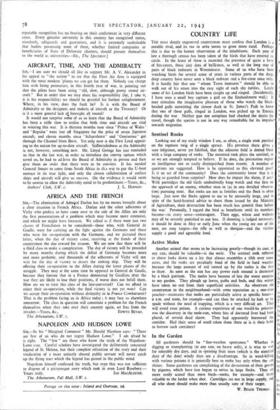COUNTRY LIFE
Tan most deeply engrooved countryman must confess that London is a notable rival, and its rus in urbe seems to grow more rural. Perhaps this is due to the keener observation of the inhabitants. Each year of late a thorough census has been taken of the birds that have entered its circle. In the latest of these is recorded the presence of quite a bevy of fire-crests, those tiny dots of brilliance, as well as the long stay of pairs of black redstarts in Westminster. Some of us who have been watching birds for several score of years in various parts of the deep, deep country have never seen a black redstart and a fire-crest once only. It is hardly fair that one " whom Town immures " should be able to walk out of his street into the easy sight of such shy rarities. Lately some of his London birds have been caught up and ringed. (Incidentally, I have seen a small boy capture a gull on the Embankment wall.) It
i
may stimulate the imaginative pleasure of those who watch the black- S. headed gulls outwitting the slower duck in St. James's Park to know e that one of these gulls, ringed in London, was picked up in Estonia a during the war. Neither gun nor aeroplane had checked the desire for Y travel, though the species is not in any way remarkable for its impulse in towards migration.
Sentinel Rooks Looking out of my study window I see, as often, a single rook perched on the topmost twig of a single spruce. His presence there gives a sure inference, never yet falsified, that the adjacent field is dotted black with a large company of rooks. The mounted rook plays the sentinel, or so we are strongly tempted to believe. If he does, the precaution argues an intelligence not so easily distinguished from reason. A number of questions are suggested. How is he appointed to this elevated post? Is it an act of the community? Does the community know that it is being so guarded from surprise? How does he impart the alarm, if any? With partridges the old birds undoubtedly keep watch and rise first on the approach of an enemy, whether man or (as in one detailed observa- tion) pursuing stoat. But rooks are not in families and the flock is often large. Just now the flocks appear to me to be unusually large, and in spite of the hard-hearted advice to shoot them issued by she Ministry of Agriculture, their destruction has been much less general than before the war: Personally, I regard the bird as beneficent until its numbers become—in every sense—extravagant. Then eggs, wheat and walnuts may all be severely punished to our loss. If shooting is judged necessary, it should be done in May or early June when the young are out of the nest, are easy targets—for rifle as well as shotgun—and the victims supply a good and agreeable food.
Active Moles Another animal that seems to be increasing greatly—though its coat, at any rate, should be valuable—is the mole. The sentinel rook referred to above looks down on a Icy that almost resembles a tilth over some acres, and the rooks are peculiarly fond of the field in hard weather because the large amount of soil turned up by the moles is the first to thaw. As soon as the sun has any power each mound is decorated by a black garrison. The moles have become of late the worst enemies to my garden. They plough up lawns, paths and beds, and this winter have taken no rest from their superficial activities. An observant old countryman in the neighbourhood—with some reputation as a one-time poacher—maintains that moles are particularly active at specific hours- 9 a.m. and noon, for example—and can then be attacked by fork or by spade without the need of trapping, which is a very difficult art. They will avoid even poison. A curious experience of one would-be poisoner was the discovery in the mole-run, where bits of doctored liver had been placed, of several dead shrew. They had apparently borrowed the corridor. Had their sense of smell taken them there or is it their habit to borrow such corridors?
In the Garden All gardeners should be "fine-weather sportsmen." Whether in digging or transplanting (at any rate, on heavy soils), it is wise to wait for tolerably dry days, and in spraying fruit trees (which is the standard duty of the date) windy days are a disadvantage. So in weed-killing with various poisons it is generally best to make hay only when the Sun shines. Some gardeners are complaining of the devastation of their greens by pigeons, which have just begun to arrive in large flocks. They ate more easily scared than most birds—rooks, for example—and more valuable to the larder when shot. Cartridges are not in large supply, and all who shoot should make more than usually sure of their target.
W. BEAC:H TnomAs.


























 Previous page
Previous page